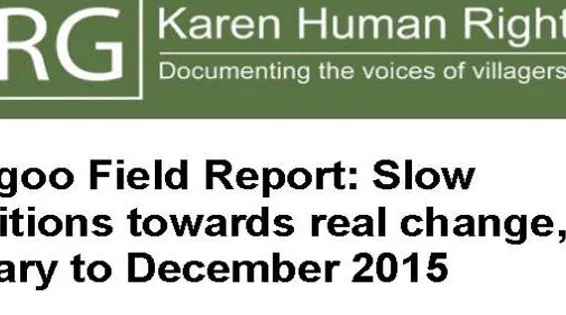Toungoo Field Report: Slow transitions towards real change, January to December 2015
20 January 2017

This report covers issues including land confiscation, education, healthcare, development projects, military activity, drug issues, and discrimination against Muslim people, which occurred between January and December 2015 in Htantabin and Thandaunggyi Townships in Toungoo (Taw Oo) District. Since the 2012 preliminary ceasefire[1], villagers have also seen an increase in development projects in local areas. These projects are often accompanied by land confiscation, which in the cases below has negatively impacted villagers’ livelihoods and, as a result, prevented them from accessing essential healthcare services.
Land confiscation
In the years since the preliminary ceasefire agreement was signed between the Karen National Union (KNU) and the Burma/Myanmar government, land confiscation has remained a major issue in all districts across Karen State. The land confiscation incidents reported by KHRG community members in Toungoo District in 2015 were predominantly perpetrated by businesses,[2] Tatmadaw,[3] and the Burma/Myanmar government.[4] These groups give permission, or directly sell, to companies such as Kaung Myanmar Aung[5] and Shwe Swan In,[6] to carry out business activities on land traditionally used and possessed by local villagers in rural areas, including land on which the villagers previously held land titles. Livelihood impacts caused by this land confiscation, such as losing vocational work, are compounding; they lead to further problems, such as inability to pay for the cost of education or healthcare.
In Toungoo district, land confiscation and destruction is also caused by development projects, such as dam building,[7] construction of electricity cables and pylons,[8] creation of an industrial zone,[9] road construction,[10] and other military purposes. For example, in 2014 the Burma/Myanmar government confiscated areas of land for which villagers already possessed land titles. This land, in C— and D— villages, was then sold to Nyein Chan Yay [Peace Group].[11] In many cases, offending actors did not fairly provide compensation, and neither the compensation nor consultation process was carried out to the satisfaction of the local civilians. According to a local resident interviewed by a KHRG community member on November 22nd 2015, in E— Village in Toungoo District, about business activities conducted by Kaung Myanmar Aung and Shwe Swan In companies, “they forcibly gave 50,000 kyat [US $36.64][12] per acre of land. Whether the villagers take their money or not, they will lose their lands so they take the money even though they do not want to take money and sell their land. They were afraid of the authoritative system…There was no discussion [consultation] with the villagers. They do not take the consent from the villagers”.[13]
Furthermore, in some cases villagers whose land was confiscated were not provided with compensation despite having previously received official Burma/Myanmar government permission to use the land. In an interview conducted by a KHRG community member in F— Village, Na Ga Mauk village tract in Htantabin Township, a villager commented on the practices of Kaung Myanmar Aung Company, “They never say that they are going to pay the compensation. We also do not want to get the compensation that they will pay to us. They [company] said that a rubber tree [is] worth 200 kyat (US $0.15). What can we do with 200 kyat (US $0.15)?”
Local villagers respond to incidents of land confiscation by development projects with various village agency strategies, including: trying to stop the perpetrators by sending complaint letters[14] to high level authorities, or holding protests[15] before the development projects are carried out.
Download full report in English HERE.
Announcements
21 May 2025
Open letter: Malaysia must lead ASEAN with principle, not hypocrisy, to address the Myanmar crisis

Progressive Voice is a participatory rights-based policy research and advocacy organization rooted in civil society, that maintains strong networks and relationships with grassroots organizations and community-based organizations throughout Myanmar. It acts as a bridge to the international community and international policymakers by amplifying voices from the ground, and advocating for a rights-based policy narrative.